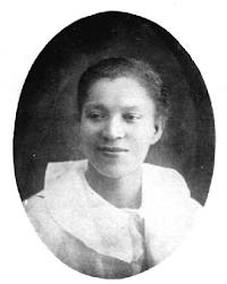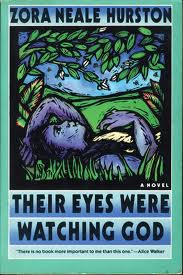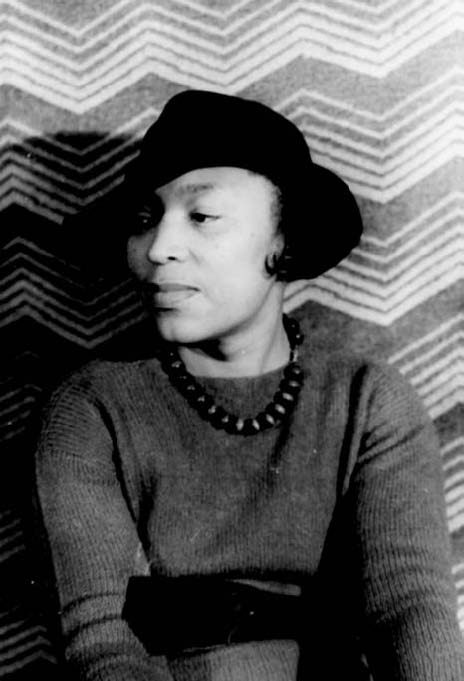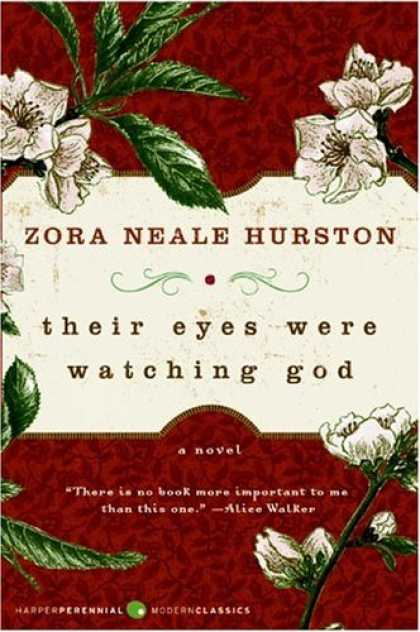FBR's team blogged from Miami Book Fair International, covering the Evenings With Presentations, Festival of Authors, and Street Fair, November 11-18, 2018
Check out The FBR Book Fair 2018 Blog here.
Left: 2018 Miami Book Fair International poster by Luis Valle. Learn more.
Check out The FBR Book Fair 2018 Blog here.
Left: 2018 Miami Book Fair International poster by Luis Valle. Learn more.
FBR Feature: Zora Neale Hurston
The Parallax Effect:
Three Ways of Looking at Their Eyes Were Watching God
by Julie Marie Wade
Three Ways of Looking at Their Eyes Were Watching God
by Julie Marie Wade
A parallax is the apparent shift caused by viewing an object from different vantage points. The parallax effect is evident when viewing the position of the moon from different places on earth, or from the same place at different times throughout the night.
|
I remember how, on evening car rides as a child, I would stretch out on the backseat and watch the yellow moon skate with ever-increasing speed along the black lanes of the sky. When my father turned into the driveway and my mother pulled open the passenger door, there was the moon, bobbing in place like a buoy at sea, or a perfect spotlight cast on the stage of our lawn.
“Look, Mom!” I would shout, pointing. “Look what followed us home!” Of course I learned soon enough that the moon wasn’t really following us; this was just a pleasing illusion. The moon had no special interest in me, or in my family, or in our ordinary American sedan or our red brick house in the suburbs. But in my future life, I often recalled that feeling of bemused delight—that time before I knew too much—when I could still believe the moon trailed along behind us of its own particular, celestial volition. That’s how reading was, too, in those days. I chose books as I once imagined the moon had chosen me. The library was teeming with them after all, tall shelves stacked with mystery novels and love stories and introspective dramas, just as the street outside teemed with Buicks and Pontiacs and Fords. A book had to win me over, with the cover or the first line or the elegance of the author’s name, and then I would follow it forever, through any number of pages, around dark corners and down steep ravines until the book at last brought me safely, if breathlessly, home. |
*
|
I first encountered Their Eyes Were Watching God when I was seventeen, a student in Ms. Kaz’s American Literature class. By this time, most of my reading was assigned, and most of my responses were graded. I no longer lingered in the library trying to decide between this fiction or that collection of poems. I had a reading list; I had deadlines. Still, I learned I could exert control over each required volume, bending its language and imagery to my will the way some magicians could bend spoons with the power of their minds.
Their Eyes Were Watching God was, in fact, a book I might well have chosen from the library shelves. The cover was lush and green with the figure of a girl reclining in the grass while gazing up at a flowering tree. The first line was compelling enough—more enigmatic than expository, which I liked: “Ships at a distance have every man’s wish on board” (1). And who could dispute the elegance of the author’s three names that moved together like a bar of music? Zora Neale Hurston. But in that moment, I needed books to be about me, exclusively. This was not some version of the mimetic imperative that art should imitate life; it was rather the invested and closely guarded myopia of adolescence: I see what I want to see. Ms. Kaz even noted on my essay, “Remember, there’s more to the book than Chapter 2!” There was, of course, but Chapter 2 chronicled a central moment in Janie Crawford’s adolescence—her first kiss with Johnny Taylor under the blossoming pear tree. I could see no difference in our time periods or subject positions. It was of no consequence to me that Janie was black and had grown up poor, tended by her grandmother in a small house in western Florida, while I was white and privileged and reading this book as a student at an expensive Catholic girls’ school in western Washington a full sixty years later. |
The narrator recounted the young protagonist’s worldview: “Janie saw her life like a great tree in leaf with the things suffered, things enjoyed, things done and undone. Dawn and doom was in the branches” (8). I knew this feeling! I claimed it as my own. Surely I had written something equally passionate and poetic in my diary, I reasoned, describing myself and my own fraught yearnings: “She searched as much of the world as she could from the top of the front steps and then went on down to the front gate and leaned over to gaze up and down the road. Looking, waiting, breathing short with impatience. Waiting for the world to be made” (11).
But then Janie Crawford marries a man her grandmother has selected for her, a man named Logan Killicks who has no romance about him but is assured to be a good provider. Janie and I are both overcome with boredom—she with her life, and I with her.
But then Janie Crawford marries a man her grandmother has selected for her, a man named Logan Killicks who has no romance about him but is assured to be a good provider. Janie and I are both overcome with boredom—she with her life, and I with her.
*
Eight years later, I read Their Eyes Were Watching God as a graduate student in a women’s studies course. By this time, my adolescent myopia had given way to a stalwart, feminist lens. I studied all texts through the small, grim bifocals of gender inequality and female empowerment, poised like certainty on the bridge of my nose. I found myself highlighting passages like “She knew now that marriage did not make love. Janie’s first dream was dead, so she became a woman” (24). In the margins, I jotted feminist awakening? Then, placing a star beside these lines—“Janie did what she had never done before, that is, thrust herself into the conversation” (70)—I noted finding her voice, renouncing silence!This protagonist was on a quest for self-knowledge, seeking independence from oppressive men. She was destined to become a feminist hero.
When Janie’s second husband, Mayor Starks, dies, she takes a moment for herself, there in the room where his lifeless body lies. I underlined the entire passage, signaling to myself that this was the crux of the narrative, our protagonist liberated from her patriarch at last:
When Janie’s second husband, Mayor Starks, dies, she takes a moment for herself, there in the room where his lifeless body lies. I underlined the entire passage, signaling to myself that this was the crux of the narrative, our protagonist liberated from her patriarch at last:
She thought back and forth about what had happened in the making of a voice out of a man. Then thought about herself. Years ago, she told her girl self to wait for her in the looking glass. It had been a long time since she had remembered. Perhaps she’d better look. [self-discovery!] She went over to the dresser and looked hard at her skin and features. The young girl was gone, but a handsome woman had taken her place. She tore off the kerchief from her head and let down her plentiful hair [gesture of freedom, no longer bound] (83).
But what about the rest of the book?” my professor asked. “You focus so much on the first half, but what of Janie and Tea Cake and those middle years of her life?”
|
This was a problem. I didn’t like Tea Cake,
and I wasn’t sure I liked who Janie became when she was with him. I
saw him as a swindler, just as Janie herself
had initially feared—someone who could not be trusted. After all, Tea
Cake lured her away from everyone she knew
and married her in faraway Jacksonville, a town where he had
connections but she had none. Then, the
morning after their wedding, Janie’s new husband stole two hundred
dollars she had hidden in her purse and
disappeared without a trace after promising to go out and find them
some fish for breakfast. Janie grew frantic with
worry and waited all day and night for him. Tea Cake recounted
to her upon his return that he had found her money and
been enticed by it. Suddenly, he was rich enough to buy
whatever he wanted, rich enough to throw a splendid party with food
and drink, live music and dancing. The
narrator recounts, “He had done found out how rich people feel and he
had a fine guitar and twelve dollars left in
his pocket and all he needed now was a great big old hug and kiss from
Janie” (118).
Janie tells him, “Looka heah, Tea Cake, if you ever go off from me and have a good time lak dat and then come back heah tellin’ me how nice Ah is, Ah specks tuh kill yuh dead. You heah me?” Tea Cake offers no apology in response, and no explanation that I as a reader am willing to accept or believe. He informs his new wife simply, and without remorse, “From now on you’s mah wife and mah woman and everything else in de world Ah needs.” Janie appears satisfied and accepts the reprisal of an old, familiar burden—becoming the world for a man again. At this point, I had lost sight of Janie, her own unique motives and desires. She was eclipsed once more, in my reading, by the motives and desires of a man. Was this an allegory of the backlash against feminism? Was this a parable of internalized oppression? Whatever it was, I couldn’t imagine why Alice Walker, a pioneer of the second wave and a womanist I greatly admired, was quoted on the lush green cover as saying, “There is no book more important to me than this one.” |
*
Recently, I read Their Eyes Were Watching God for the third time. I mused that I am nearly twice the age I was the first time I plumbed these chapters, propped against my high school locker, searching for myself on every page. When I was coming of age, Their Eyes Were Watching God became of that moment’s necessity a sensual and reflective bildungsroman. As Janie’s grandmother told her, so I imagined my own grandmother telling me: “you ain’t no everyday chile like most of ‘em” (15). We were special, Janie and I; we could have no ordinary destiny.
|
Later, when I was a burgeoning student of feminist studies, the same book became a treatise on the small victories and greater failings of the feminist movement. The victory was evident in an insight like this one: “She stood there until something fell of the shelf inside her” (67). But by the next page, our incipient feminist misinterprets her possibilities, sells herself short: “She was saving up feelings for some man she had never seen” (68). Janie was still waiting for a man to complete her.
On my third reading, I still noticed familiar tropes of the bildungsroman. I still recognized depictions of gender relations that challenged my contemporary notions of what it means to be a woman in the world. But this time, I was struck most by the poetics of Hurston’s project, the spiritual imperative that seemed to propel her words. Why had I never considered the title before? Hurston didn’t name this novel Her Eyes Were Gazing Within or Her Eyes Were Watching Men. The title comes from a passage late in the book, after Janie and Tea Cake have migrated to southern Florida in search of work. As the dreaded hurricane approached, “they sat in company with the others in other shanties […] They seemed to be staring at the dark, but their eyes were watching God.” (151) |
This is the true crux of the narrative, I realized. It is a moment of existential crisis, fear of death, and perhaps most significantly, recognition of helplessness. Janie and Tea Cake and the other workers confront their human vulnerability when faced with forces larger than themselves and entirely beyond their control: “It is so easy to be hopeful in the day time when you can see the things you wish on. But it was night, it stayed night. Night was striding across nothingness with the whole round world in his hands” (150).
The Janie we meet at the end of the book has grown in wisdom, but not in certainty. She tells her friend Pheoby, to whom she has recounted her long life story: “Two things everybody’s got tuh do fuh theyselves. They got tuh go tuh God, and they got tuh find out about livin’ fuh theyselves” (183). This is the real work of imaginative literature, I think—to become more riddle than mirror, more koan than treatise. Pheoby, like any listener to Janie’s tales, may be moved by her misfortunes and inspired by her perseverance. But there is no formula or prescription Janie can offer her, or any of us, for the spiritual and practical questions that inevitably attend our lives.
“Love is lak de sea,” Janie proclaims. “It’s uh movin’ thing, but still and all, it takes its shape from de shore it meets, and it’s different with every shore” (182). Here she points to context, idiosyncrasy, and chance as irrefutable forces at work when anyone seeks to follow her heart.
Their Eyes Were Watching God resonates with me now the way a symphony does, or an interpretive dance, or a lightning-and-thunder storm. I feel its magnificent and mysterious power like a current passing through me. The effect grows more visceral and more unsettling the less I seek to impose a thesis on Hurston’s oracular form.
In other words, I no longer project myself onto the character of Janie, and I no longer expect Janie to stand in for all of womankind. She is neither proxy nor metonym to me now. The narrator recounts at the midpoint of the book how Janie “sat on the porch and watched the moon rise. Soon its amber fluid was drenching the earth, and quenching the thirst of the day” (95). I like to imagine myself sitting beside her, watching that same moon and seeing it differently.
Julie Marie Wade, the author of Wishbone: A Memoir in Fractures, Without, Small Fires, and Postage Due, is the newest member of the creative writing faculty at Florida International University. Learn more on her website.
The Janie we meet at the end of the book has grown in wisdom, but not in certainty. She tells her friend Pheoby, to whom she has recounted her long life story: “Two things everybody’s got tuh do fuh theyselves. They got tuh go tuh God, and they got tuh find out about livin’ fuh theyselves” (183). This is the real work of imaginative literature, I think—to become more riddle than mirror, more koan than treatise. Pheoby, like any listener to Janie’s tales, may be moved by her misfortunes and inspired by her perseverance. But there is no formula or prescription Janie can offer her, or any of us, for the spiritual and practical questions that inevitably attend our lives.
“Love is lak de sea,” Janie proclaims. “It’s uh movin’ thing, but still and all, it takes its shape from de shore it meets, and it’s different with every shore” (182). Here she points to context, idiosyncrasy, and chance as irrefutable forces at work when anyone seeks to follow her heart.
Their Eyes Were Watching God resonates with me now the way a symphony does, or an interpretive dance, or a lightning-and-thunder storm. I feel its magnificent and mysterious power like a current passing through me. The effect grows more visceral and more unsettling the less I seek to impose a thesis on Hurston’s oracular form.
In other words, I no longer project myself onto the character of Janie, and I no longer expect Janie to stand in for all of womankind. She is neither proxy nor metonym to me now. The narrator recounts at the midpoint of the book how Janie “sat on the porch and watched the moon rise. Soon its amber fluid was drenching the earth, and quenching the thirst of the day” (95). I like to imagine myself sitting beside her, watching that same moon and seeing it differently.
Julie Marie Wade, the author of Wishbone: A Memoir in Fractures, Without, Small Fires, and Postage Due, is the newest member of the creative writing faculty at Florida International University. Learn more on her website.
|
More info on Zora Neale Hurston may be found here:
The Official Zora Neale Hurston Society The Zora Neale Hurston Festival of Arts and Humanities is held in Eatonville, FL, every January. St. Lucie County's Dust Tracks Zora Neale Hurston Heritage Trail was officially dedicated in 2004. Kiosks mark Hurston's journey through Florida, including the house pictured at left, where Hurston lived, which is on the National Register of Historic Places and was designated a National Historic Landmark by the U.S. Department of Interior and National Park Service. |






